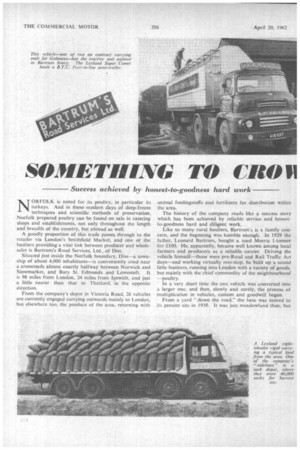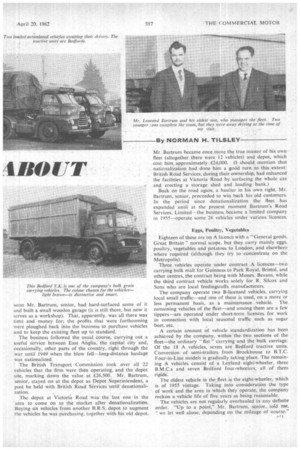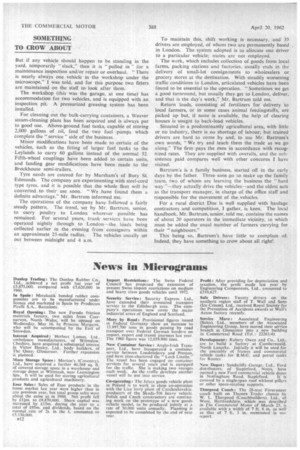SOMETHING TO CR011
Page 44

Page 45

Page 46

If you've noticed an error in this article please click here to report it so we can fix it.
"BOUT
By NORMAN H. TILSLEY
Success achieved by honest-to-goodness hard work
NOR.FOLK is noted for its poultry, in particular its turkeys. And in these modern days of deep-freeze techniques and scientific methods of preservation. Norfolk prepared poultry can be found on sale in catering shops and establishments, not only throughout the length and breadth of the country, but abroad as well.
A goodly proportion of this trade passes through to the retailer via London's Smithfield Market, and one of the hauliers providing a vital link between producer and wholesaler is Bartrum's Road Services, Ltd., of Diss.
Situated just inside the Norfolk boundary, Diss—a township of about 4,000 inhabitants—is conveniently sited near a crossroads almost exactly halfway between Norwich and Stowmarket, and Bury St. Edmunds and Lowestoft. It is 98 miles from London, 24 miles from Ipswich, and just a little nearer than that to Thetford, in the opposite d irection.
From the company's depot in Victoria Road, 26 vehicles are currently engaged carrying outwards mainly to London, but elsewhere too, the produce of the area, returning with animal feedingstuffs and fertilizers for distribution within the area.
The history of the company reads like a success story which has been achieved by reliable service and honestto-goodness hard and diligent work.
Like so many rural hauliers, Bartrum's is a family concern, and the beginning was humble enough. In 1929 the father, Leonard Bartrum, bought a used Morris 1-tonner for £100. He, apparently, became well known among local farmers and producers as a reliable carrier. Driving the vehicle himself—those were pre-Road and Rail Traffic Act days—and working virtually non-stop, he built up a sound little business, running into London with a variety of goods, but mainly with the chief commodity of the neighbourhood —poultry.
In a very short time the one vehicle was converted into a larger one, and then, slowly and surely, the process of multiplication in vehicles, custom and goodwill began.
From a yard down the road," the base was moved to its present site in 1938. It was just meadowland then, but soon Mr. Barnum, senior, had hard-surfaced some of it and built a small wooden garage (it is still there, but now it serves as a workshop). That, apparently, was all there was time and money for; the profits that were forthcoming were ploughed back into the business to purchase vehicles and to keep the existing fleet up to standard.
The business followed the usual course, carrying out a useful service between East Anglia, the capital city and', occasionally, other parts of the country, right through the war until 1949 when the blow fell—long-distance haulage was nationalized.
The British Transport Commission took over all 22 vehicles that the firm were then operating, and the depot site, marking down the value at £26,500. Mr. Bartrum,. senior, stayed on at the depot as Depot Superintendent, a post he held with British Road Services until denationalization.
The depot at Victoria Road was the last one in the area to come on to the market after denationalization. Buying six vehicles from another B.R.S. depot to augment the vehicles he was purchasing. together with his old depot. Mr. Bartrum became once more the true master of his own fleet (altogether there were 12 vehicles) and depot, which cost him,. approximately £24,000. (I. should mention that nationalization had done him a gacid turn to this extent: British Road Services, during their ownership, had enhanced the facilities at Victoria Road by surfacing the whole site and erecting a storage shed and loading bank.) Back on the road again, a haulier in his own right, Mr. Barnum, senior, proceeded to win back his old customers. In the period since denationalization the fleet has expanded until at the present moment Bartrum's Road Services, Limited—the business became a limited company in 1955—operate some 26 vehicles under various licences.
Eggs, Poultry, Vegetables Eighteen of these are on A licence with a "'General goods, Great Britain " normal scope, but they carry mainly eggs, poultry, vegetables and potatoes to London, and elsewhere where required (although they try to concentrate on the Metropolis).
Three vehicles operate under contract A licences—two carrying bulk malt for Guinness to Park Royal, Bristol, and other centres, the contract being with Messrs. Bevans, while the third contract vehicle works solely for R. Silcox and Sons who are local feedingstuffs manufacturers.
The company operate two B-licensed vehicles, carrying local small traffic—and one of these is used, on a more or less permanent basis, as a maintenance vehicle. The remaining vehicles of the fleet—and among them are a few tippers—are operated under short-term licences for work in connection with local seasonal traffic such as sugar beet, etc.
A certain amount of vehicle standardization has been achieved by the company, within the two sections of the fleet—the ordinary " flat " carrying andthe bulk carriage. Of the 18 A vehicles, seven are Bedford tractive units. Conversion of semi-trailers from 13rockhouse to B.T.C. Four-in-Line models is gradually taking place. The remaining A vehicles consist of a Leyland eight-wheeler, three B.M.C.s and seven Bedford four-wheelers, all of them rigids.
The oldest vehicle in the fleet is the eight-wheeler, which is of 1955 vintage. Taking into consideration the type of work and the area in which they operate, the company reckon a vehicle life of five years as being reasonable.
The vehicles are not regularly overhauled in any definite order. "Up to a point," Mr. Bartrum, senior,_ told me. "we let well alone, depending on the mileage of course." But if any vehicle should happen to be standing in the yard. temporarily 'slack," then it is " pulled in" for a maintenance inspection and/or repair or overhaul. "There is nearly always one vehicle in the workshop under the microscope," I was told, and for this purpose two fitters are maintained on the staff to look after them.
The workshop (this was the garage, at one time) has accommodation for two vehicles, and is equipped with an inspection pit. A pressurized greasing system has been installed.
For cleaning out the bulk-carrying containers, a Weaver steam-cleaning plant has been acquired and is always put to good use. Above-ground fuel tanks, capable of storing 2,000 gallons of oil, feed the two fuel pumps which complete the " service " side of the business.
Minor modifications have been made to certain of the vehicles, such as the fitting of larger fuel tanks to the Leylands to carry 60 gallons instead of the normal 32.• Fifth-wheel couplings have been added to certain units, and landing gear modifications have been made to the 13rockhouse semi-trailers.
Tyre needs are catered for by Marsham's of Bury St. Edmunds. The company are experimenting with steel-cord type tyres. and it is possible that the whole fleet will be converted .to their use soon. "We have found them a definite advantage," Mr. Bartrum informed me.
The operations of the company have followed a fairly steady pattern. The trend, set by Mr. Bartrum, senior, to carry poultry to London wherever possible has remained. For several years, trunk services have been operated nightly through to London—the loads being collected earlier in the evening from consignors within an approximate 25-mile radius. The vehicles usually set out between midnight and 4 a.m. To maintain this, shift working is necessary, and 35 drivers are employed, of whom two are permanently based in London. The system adopted is to allocate one driver to a particular vehicle; mates are not employed.
The work, which includes collection of goods from local farms, packing stations and factories, usually ends in the delivery of small-lot consignments to wholesalers or grocery stores at the destination. With steadily worsening traffic conditions in London, articulated vehicles have been found to be essential to the operation. "Sometimes we get a good turnround, but usually they get to London, deliver, and that is the day's work," Mr. Bartrum told me.
Return loads, consisting of fertilizers for delivery to local farmers, or in some cases animal feedingstuffs, are picked up but, if none is available, the help of clearing houses is sought to back-load vehicles.
Situated in a predominantly agricultural area, with little or no industry, there is no shortage of labour; but trained drivers are hard to come by and, to use Mr. Bartrum's own words, "We try and teach them the trade as we go along." The firm pays the men in accordance with recognized rates. They are supplied with overalls, and the subsistence paid compares well with other concerns I have visited.
Bartrum's is a family business, started off in the early days by the father. Three sons go to make up the family team, two of whom are learning the business the "hard way "—they actually drive the vehicles—and the eldest acts as the transport manager, in charge of the office staff and responsible for the movement of the vehicles.
For a rural district Diss is well supplied with haulage contractors and competition, I gather, is keen. The local handbook, Mr. Bartrum, senior, told me, contains the names of about 20 operators in the immediate vicinity, to which must be added the usual number of farmers carrying for their "neighbours."
This being so, Bartrum's have little to complain of. Indeed, they have something to crow about all right!
















































































































